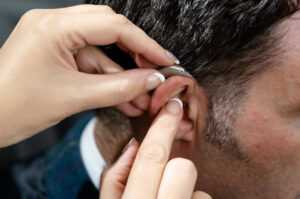Struggling with hearing? Request a hearing test appointment today.
Do you need hearing aids for mild hearing loss?

You may be asking yourself, “Do I need a hearing aid for mild hearing loss?” The answer is yes! Those experiencing mild hearing loss will greatly benefit from hearing aids – even when the hearing loss is minimal. Hearing loss can affect more than just your hearing so the benefits extend beyond just hearing.
While some might believe that hearing aids are only necessary for severe hearing loss, even those with mild hearing loss can experience notable benefits from using these devices.
Generally, there are four types of hearing loss: mild, moderate, severe and profound. Hearing issues can affect people of any age, from newborns to people in their early 20s and the elderly; but whatever the case, it’s likely you can restore some or all of your loss with hearing aids.
In this post, we’re going to focus on mild hearing loss, a condition that many people suffer from and may not even know it. And we’ll also examine if hearing aids can help with mild hearing loss so that you get back your hearing and enjoy life to the full once again. If you’re having trouble with your hearing, you should visit an audiologist as soon as possible to find out the degrees of hearing loss you may be afflicted with and do something about it.
Key Takeaways
- Mild hearing loss affects millions in the UK, yet many endure it without seeking help. There’s no need to suffer in silence!
- If diagnosed with mild hearing loss, you could greatly benefit from modern hearing aids. These devices are not only sleek and stylish but also offer numerous advantages beyond improved hearing.
- While some believe hearing aids are only for severe hearing loss, even those with mild symptoms can experience significant improvements in their quality of life.
What Is Mild Hearing Loss?
Mild hearing loss is a condition that millions of people around the UK suffer from, and sadly and for different reasons, many people just put up with it instead of seeing their GP or audiologist. It’s estimated that around 6 million people in Britain could benefit from using a hearing aid, not only restoring their hearing but also their quality of life and protecting their health, since hearing loss can lead to depression, dementia and other issues.
People who have mild hearing loss are usually able to hear most things — like speech — in quiet settings, but it can be a bit muffled and they might have trouble distinguishing what someone is saying from noises such as traffic or music. They may also think people are mumbling when they talk to them — when they’re not. Those who suffer from mild hearing loss often have a feeling that they have too much wax in their ears — when they don’t — and might think all they need is to have their ears syringed to remove a buildup of ear wax.
What Causes Mild Hearing Loss?
One of the most common causes of mild hearing loss is prolonged and repeated exposure to loud noise, something many of us experience every day. The parts of the ear that process soundwaves and send them on to the brain for processing, enabling us to hear, are incredibly delicate structures, and damage can be irreparable.
Too much ear wax can indeed also be a cause of mild hearing loss, and it’s quickly resolved by syringing or, as we also do, microsuction for ear wax removal — a gentle and easy way to get the buildup out of your ears. Ear infections are another cause, and can be resolved with a course of antibiotics.
And as people age, and reach their 60s and beyond, many find that their hearing declines. It’s most often mild hearing loss, but a lot of elderly people don’t do anything about it because they think nothing can be done. That’s almost always not the case, and first having a hearing test and then choosing a solution can be transformative in how people live their lives.
Do I Need a Hearing Aid for Mild Hearing Loss?
If you’ve been diagnosed with mild hearing loss after having a hearing test, you may certainly be a good candidate for a hearing aid. Modern hearing aids are sleek and even stylish and do so many things other than letting you hear properly. You can even use them to listen directly to the TV, take calls and stream music thanks to embedded Bluetooth technology.
Depending on the model you choose, hearing aids may be almost entirely unnoticeable, or at very worst, not much bigger than the earbuds everyone is now wearing to listen to music. In fact, the majority of hearing aids are virtually invisible nowadays. We’ve come a long way in the last few years in designing hearing aids for everyone, and any stigma that they’re “just for the elderly” is long since gone.
Related reading: How to convince someone they need a hearing test
We all need a little helping hand every now and then, including hearing aids for mild hearing loss.
What do our audiologists say?
“The perception that hearing aids are only for the elderly is outdated. Modern hearing aids are sleek, virtually invisible, and packed with advanced technology. The benefits they offer far outweigh any outdated stigma. Embracing hearing aids can transform your life, enhancing your ability to connect with others and enjoy everyday activities. It’s time to view them as a smart, proactive choice for maintaining your quality of life.” Lindsay Fletcher, (RHAD), (BSHAA), FdA
Why you should get a hearing aid even if hearing loss is mild
While some may think that hearing aids are only necessary for severe hearing loss, even those with mild hearing loss can gain considerable advantages from these devices.
Improved Communication
One of the key benefits of hearing aids for those with mild hearing loss is improved communication. Individuals with mild hearing loss frequently struggle to follow conversations, particularly in noisy settings like restaurants or social gatherings. Hearing aids amplify sounds, making speech clearer and reducing the need to ask others to repeat themselves. This can lead to more engaging and less frustrating interactions with family, friends, and colleagues.
Enhanced Quality of Life
Hearing aids can greatly enhance your quality of life. They help individuals re-engage in activities they might have avoided due to hearing difficulties, such as attending social events, going to the theatre, or enjoying nature walks where they can hear birds chirping. By improving the ability to hear, hearing aids enable people to participate more fully in life’s activities, leading to increased satisfaction and happiness.
Cognitive Health Benefits
Using hearing aids can also contribute to better cognitive health. Research has indicated that untreated hearing loss is associated with an increased risk of cognitive decline and dementia. By using hearing aids, individuals can maintain better auditory stimulation, which is crucial for keeping the brain active and engaged. This can potentially delay or prevent cognitive decline, contributing to overall mental well-being.
Reduced Tinnitus Symptoms
For many people with mild hearing loss, tinnitus (a ringing or buzzing in the ears) can be a bothersome issue. Hearing aids can help mask the symptoms of tinnitus by amplifying external sounds and making the internal noise less noticeable. This can provide significant relief and improve concentration and comfort in daily activities.
Preventing Further Hearing Damage
Addressing mild hearing loss early with hearing aids can also help prevent further damage. By amplifying sounds to a comfortable level, hearing aids reduce the strain on the ears and brain, which might otherwise be working harder to decipher sounds. This can prevent the progression of hearing loss and maintain better hearing health over time.
Modern Convenience and Technology
Today’s hearing aids come equipped with advanced technology that offers a range of convenient features. Many modern hearing aids have Bluetooth capability, allowing users to stream audio directly from their phones, TVs, and other devices. This means that people with mild hearing loss can enjoy high-quality sound from various sources without the need for additional devices. Furthermore, many hearing aids are designed to be discreet and comfortable, making them easy to wear throughout the day.
Emotional and Social Benefits
Finally, the emotional and social benefits of using hearing aids cannot be overstated. Mild hearing loss can lead to feelings of isolation and frustration. By improving hearing, hearing aids can help individuals feel more connected to the world around them, boosting their confidence and emotional well-being. This can lead to stronger relationships and a more fulfilling social life.
Related reading: Do I need a hearing aid?
Are you or is someone you love having trouble with their hearing? Book a consultation with the hearing loss experts at Regain Hearing today and soon your or their hearing loss could be resolved.

 “The perception that hearing aids are only for the elderly is outdated. Modern hearing aids are sleek, virtually invisible, and packed with advanced technology. The benefits they offer far outweigh any outdated stigma. Embracing hearing aids can transform your life, enhancing your ability to connect with others and enjoy everyday activities. It’s time to view them as a smart, proactive choice for maintaining your quality of life.”
“The perception that hearing aids are only for the elderly is outdated. Modern hearing aids are sleek, virtually invisible, and packed with advanced technology. The benefits they offer far outweigh any outdated stigma. Embracing hearing aids can transform your life, enhancing your ability to connect with others and enjoy everyday activities. It’s time to view them as a smart, proactive choice for maintaining your quality of life.”